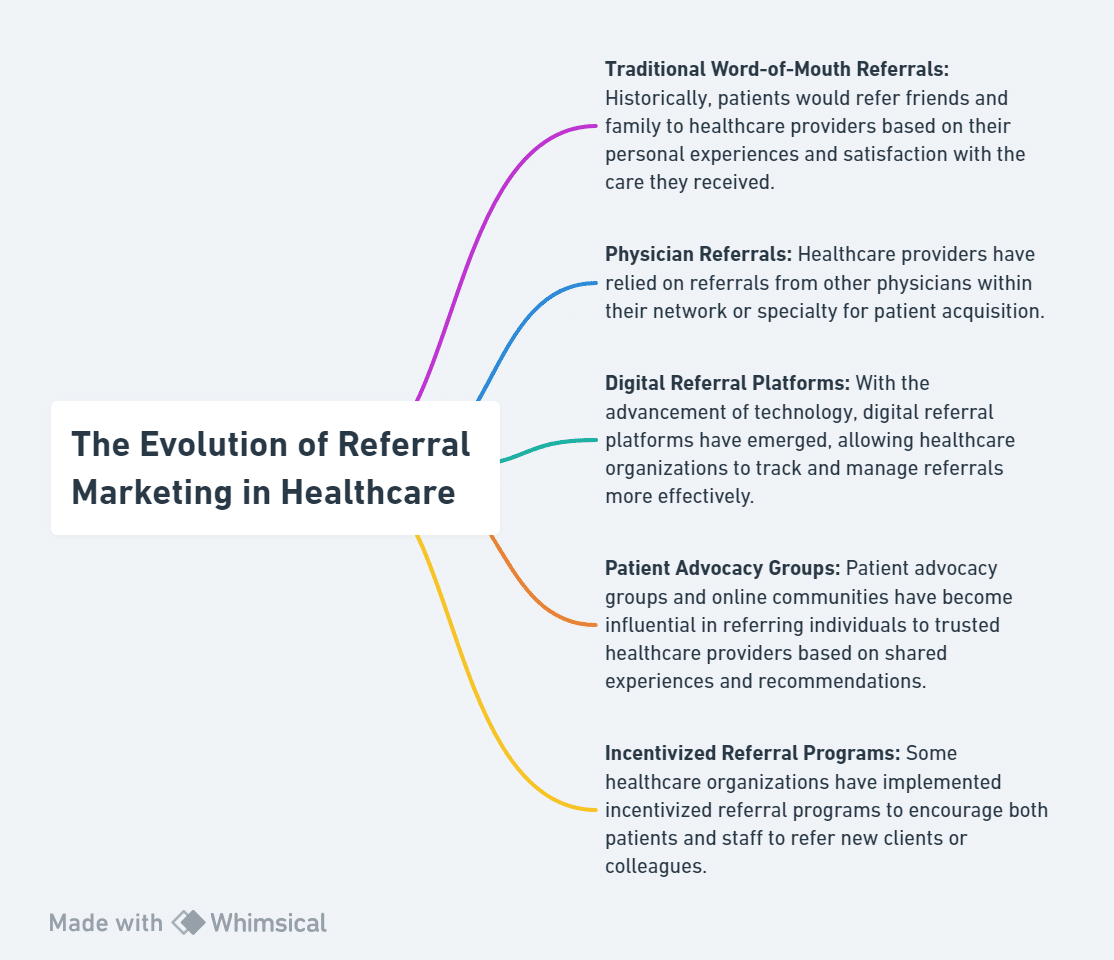Referral marketing has long been a cornerstone of healthcare. Patients often turn to their trusted healthcare providers for recommendations on specialists, treatments, and other services. In the past, referrals were primarily driven by word-of-mouth and personal connections. However, the advent of digital technologies has transformed the way patients share information and connect with Healthcare Referral Marketing providers. This has led to the evolution of referral marketing in healthcare, with new trends and strategies emerging to leverage the power of technology and social media.
The Evolution of Referral Marketing in Healthcare

Healthcare referral marketing has emerged as a cornerstone strategy for healthcare providers looking to expand their patient base and improve the quality of care. This approach leverages the trust and satisfaction of existing patients and professional networks to recommend services to potential patients. Over the years, the methods and strategies employed in healthcare referral marketing have seen significant shifts, adapting to technological advancements and changing patient expectations.
1. The Early Days: Word-of-Mouth and Printed Referrals
Initially, healthcare referral marketing relied heavily on word-of-mouth and printed referral cards. Patients who had positive experiences with their healthcare providers would informally recommend these services to friends and family. Physicians also networked with their colleagues through professional associations and meetings, exchanging printed referral cards or letters to recommend specialists or services.
2. The Digital Revolution: Online Platforms and Social Media
The advent of the internet and social media platforms transformed healthcare referral marketing, introducing digital referral systems. Healthcare providers began to utilize websites, online forums, and social media to reach out to potential patients and to encourage existing ones to share their positive experiences online. This era marked a significant shift towards a more accessible, wide-reaching method for patient referrals, enabling practices to track referrals more efficiently and engage with a broader audience.
3. Modern Innovations: Data Analytics and Personalized Marketing
Today, healthcare referral marketing has become more sophisticated, incorporating data analytics and personalized marketing strategies. Healthcare providers can now use data to understand patient behavior, track referral sources, and tailor their marketing efforts to specific demographics and patient needs. Personalized email campaigns, targeted social media ads, and automated referral tracking systems have made it easier than ever for healthcare professionals to manage referrals and measure the success of their marketing strategies.
4. The Future of Healthcare Referral Marketing: AI and Predictive Analytics
As we look to the future, healthcare referral marketing is poised to become even more advanced with the integration of artificial intelligence (AI) and predictive analytics. These technologies promise to revolutionize how healthcare providers identify potential referral sources, predict patient needs, and create highly personalized marketing campaigns. By analyzing vast amounts of data, AI can help healthcare professionals identify trends, optimize their marketing efforts, and ultimately, deliver better patient care.
The Future of Internet Referral Marketing in 2024
Cutting-Edge Trends Shaping the Future

The landscape of healthcare referral marketing is continuously evolving, with technology playing a pivotal role. One of the most significant trends is the integration of advanced digital platforms that streamline the referral process. Telehealth services, for instance, have become a crucial component of healthcare referral marketing, enabling providers to reach a broader audience by offering convenient online consultations. This digital approach not only expands the reach of healthcare services but also enhances patient satisfaction, thereby boosting referral rates.
1. Leveraging Big Data and Analytics
Big data and analytics are revolutionizing healthcare referral marketing by providing insights into patient behaviors, preferences, and outcomes. By analyzing vast amounts of data, healthcare providers can identify patterns and trends that inform more targeted and effective referral marketing strategies. Predictive analytics, in particular, allows providers to anticipate patient needs and preferences, tailoring their marketing efforts to match. This data-driven approach ensures that healthcare marketing is both efficient and personalized, significantly enhancing the effectiveness of referral programs.
2. The Rise of Patient Advocacy and Community Building
Healthcare referral marketing is increasingly focusing on building communities and empowering patient advocates. Social media platforms and online forums have become vital spaces for patients to share their experiences and recommend services. Healthcare providers are actively engaging in these communities, facilitating discussions, and sharing valuable health information. This trend not only fosters a sense of trust and loyalty among existing patients but also attracts new patients through genuine, patient-led endorsements.
3. Embracing AI and Machine Learning
Artificial intelligence (AI) and machine learning are at the forefront of the future of healthcare referral marketing. These technologies are being used to automate and optimize marketing campaigns, personalize patient communication, and improve the referral process. AI algorithms can predict which patients are more likely to refer others and identify the most effective channels for reaching potential new patients. Additionally, machine learning can enhance the patient experience by providing customized health information and support, further encouraging positive referrals.
Maximizing ROI with B2B Referral Marketing Strategies
Leveraging Social Media for Patient Referrals

Social media platforms have become invaluable tools for healthcare providers seeking to expand their patient base through Healthcare Referral Marketing. By strategically utilizing these platforms, healthcare providers can tap into vast networks of potential patients and generate a steady stream of referrals.
1. Content Marketing:
Creating and sharing high-quality content on social media is crucial for attracting and engaging potential patients. This content should focus on providing valuable information, such as health tips, treatment options, and patient testimonials. By establishing themselves as thought leaders in their field, healthcare providers can build trust and credibility, which can lead to increased referrals.
2. Social Media Advertising:
Targeted social media advertising campaigns can effectively reach specific demographics and geographic areas. By using relevant keywords and targeting options, healthcare providers can ensure that their ads are seen by individuals who are most likely to seek their services. This targeted approach can significantly increase the conversion rate of referrals.
3. Patient Reviews and Testimonials:
Positive patient reviews and testimonials on social media platforms are a powerful form of Healthcare Referral Marketing. They provide potential patients with firsthand accounts of the quality of care they can expect. By encouraging patients to share their experiences online, healthcare providers can build social proof and increase the likelihood of referrals.
4. Influencer Marketing:
Partnering with healthcare influencers who have established followings can be a highly effective way to generate referrals. These influencers can share their experiences with a healthcare provider’s services and promote them to their audience. This form of Healthcare Referral Marketing can reach a wider audience and build credibility among potential patients.
By leveraging social media effectively, healthcare providers can significantly enhance their Healthcare Referral Marketing efforts. By creating valuable content, targeting their advertising campaigns, encouraging patient reviews, and partnering with influencers, they can tap into the power of social media to attract new patients and grow their practices.
Top 10 Referral Marketing Tools to Boost Your Business
Success Stories: What We Can Learn

1. Harnessing Digital Platforms for Enhanced Visibility
One of the most compelling success stories in healthcare referral marketing comes from a small clinic that significantly increased its patient base by leveraging digital platforms. By creating a robust online presence through its website, social media, and online health forums, the clinic was able to showcase patient testimonials and detailed service offerings. This digital approach to healthcare referral marketing not only improved their visibility but also made it easier for satisfied patients to share their positive experiences with others, effectively multiplying referral rates.
2. Integrating Patient Feedback for Continuous Improvement
Another notable success in healthcare referral marketing involves a hospital that integrated patient feedback into its referral program. By actively seeking out and responding to patient feedback, the hospital demonstrated a commitment to patient satisfaction and continuous improvement. This approach not only encouraged more patients to participate in the referral program but also enhanced the hospital’s reputation for quality care. The success of this initiative underscores the importance of patient feedback in healthcare referral marketing, highlighting how it can lead to better services and higher referral rates.
3. Collaborative Partnerships Between Specialists
A remarkable example of healthcare referral marketing success is seen in the collaborative efforts between specialists to create a seamless referral network. By establishing strong partnerships and clear communication channels, these specialists were able to refer patients to each other based on specific needs and expertise. This collaborative approach not only ensured that patients received the best possible care but also fostered a sense of trust and mutual respect among healthcare providers. The success of this network highlights the value of collaboration in healthcare referral marketing, showcasing how partnerships can enhance patient care and referral efficiency.
4. Utilizing Technology to Streamline Referrals
Innovative use of technology has also led to success stories in healthcare referral marketing. A multi-specialty practice introduced a state-of-the-art referral management system that automated the referral process, making it faster and more efficient. This system allowed for real-time tracking of referrals, immediate feedback, and better communication between referring and receiving providers. The success of this technology-driven approach illustrates how healthcare referral marketing can benefit from automation and digital tools, leading to improved workflows and increased patient satisfaction.
10 Tips to Create a Referral Marketing System in 2024
Conclusion on Healthcare Referral Marketing

